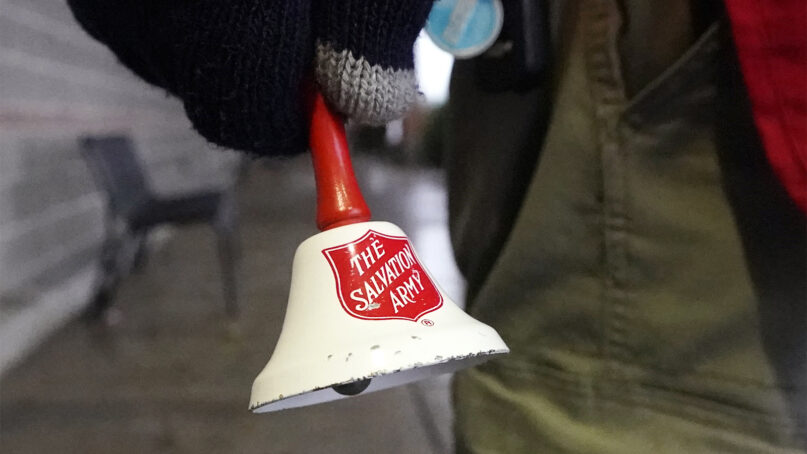(RNS) — In the middle of the 19th century an unemployed Methodist minister named William Booth and his wife, Catherine, moved to the East End of London to do what few ministers were willing to do: proclaim the gospel to the poor, the homeless and the destitute.
After more than a decade of struggles, the mission began to catch fire and expand, and the organization took on a new name that would capture both its vision and discipline: the Salvation Army.
Today its 1.8 million members serve in 132 countries. In the United States alone the army supports about 30 million Americans each year.
Yet beyond its evident good work, the Salvation Army is a powerful example of how the church must endure against the buffeting of a polarized society. In this new day of cancel culture, the Salvation Army seems to be consistently hit from both sides of the ideological divide.
If you are progressive, you may have heard at some point that the Salvation Army does not serve members of the LGBT community despite repeated attempts to establish the facts that the Salvation Army serves everyone. The U.S. national commander of the Salvation Army, David Hudson, addressed this issue two years ago in an editorial for USA Today:
Our doors are, and always have been, open to all. We don’t ask anyone their orientation, identity or beliefs, to help ensure that they feel welcome and safe. So while we can’t claim an exact number, we believe by sheer size and access that we are the largest provider of poverty relief for people in the LGBTQ community.
But more recently, the Salvation Army has come under criticism from the ideological right, as the organization tried to engage issues of race. In a guide titled “Let’s Talk About Racism,” issued in November, the Salvation Army encouraged its donors to “Lament, repent and apologize for biases or racist ideologies held and actions committed.”
Predictably, this good-faith attempt to grapple with the complexities of racism by a trusted Christian organization failed the new and evolving purity test now applied by many conservatives.
The media piled on, calling the guide evidence of the army caving to “wokeness.” Newsweek ran an article accusing the organization of “incorporating Critical Race Theory” into its initiative on racism, effectively turning CRT, the new boogeyman of the ideological right, against a historic Christian institution.
ARCHIVE: The guy in the red apron: How a Salvation Army bell ringer brings heart to the job
The article, as with other hit pieces, offers murky-at-best descriptions of CRT and how the Salvation Army is allegedly deploying it. The articles’ aim is to tarnish rather than engage. The idea that racism could have systemic elements, and that historic Christian institutions might want to explore how their history has contributed to these developments over time, is automatically considered evil.
(Full disclosure: The author of the Newsweek article, Carly Mayberry, recently wrote an odd and widely panned article where she listed me, along with pastor David Platt, VeggieTales creator Phil Vischer and other evangelicals, as progressive Christians.)
In response to the accusations about race, the Salvation Army reaffirmed how the theological root of its mission calls the organization to press forward. External communications manager Joseph Cohen recently explained,
Our beliefs have always been rooted in scripture, and they still are. That includes our complete rejection of racism, which is in stark contrast to the biblical principle that we’re all created in the image of God. We believe that, as God loves us all, so we should all love one another.
I reached out to the American commander of the Salvation Army, Commissioner Kenneth Hodder, and he responded:
While we are deeply saddened by this criticism, it has in no way deterred us from our work. We have never strayed from doing what we are called to do, and we will not do so now. We remain totally committed to preaching the gospel of Jesus Christ and meeting human needs in His name without discrimination. Our determination to fulfill that mission will never change.
But in a public statement, Salvation Army officials admitted that the guide had become too controversial, and the International Social Justice Commission has now withdrawn the guide for appropriate review.
But they indicated, “We at The Salvation Army remain undeterred in our mission because we are confident in the power of the gospel, and because millions of vulnerable Americans need our help. … Our supporters know that ours is a message of love, even for those who disagree or attack us.”
This is the Christian faith we see lived out in the New Testament: an uncompromising drive to combat injustices of this world as heralds of the coming kingdom of Jesus.
The same Scriptures that lead us to unpopular views about sex and gender also lead us to unpopular views on race and justice. It’s been that way for a long time, far longer than bell-ringing Santas.
ARCHIVE: Shutting down the manufactured critical race theory ‘debate’
If concern on the right about cancel culture is legitimate, it must start at home. How one responds to these efforts to cancel one of the world’s most impactful ministries due to ideological purity tests determines whether this concern is legitimate or simply a smokescreen for some other ideological factors.
The Salvation Army, like many similar Christian ministries, continues to represent Christ and the Scriptures. In an era of politicization, this will inevitably scandalize both sides. The challenge for us is to not let the left or right wing demonize the folks who are caring for the poor.
(Ed Stetzer is a professor and dean at Wheaton College. His latest book is “Christians in the Age of Outrage.” The views expressed in this commentary do not necessarily reflect those of Religion News Service.)





